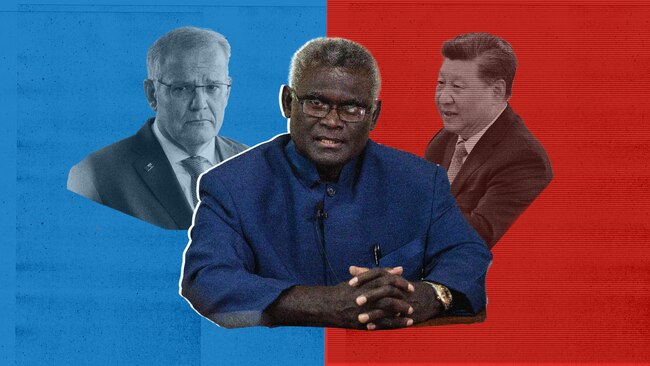Nobody puts Sogavare in the backyard
There's a rhetorical storm brewing near the Solomon Islands

There's a rhetorical storm brewing in the Solomon Islands.
Solomon Islands Prime Minister Manasseh Sogavare is not impressed with his country being referred to as Australia's "back yard".
Speaking in parliament this week the fiery leader made a point of clapping back at comments made by Home Affairs Minister Karen Andrews.
"That is our backyard, this is our neighbourhood, and we are very concerned of any activity that is taking place in the Pacific Islands," Andrews said during a recent interview when answering questions about the new strategic deal inked between the Solomons and China.
While he didn't specify if it was that exact interview or just pent up paternalism, Sogavare said he was offended.
"[The backyard] is where rubbish is collected and burnt. It is an area which supports the daily wellbeing of the residents of the house," Sogavare told his parliamentary colleagues.
"It is the area of the house where we relieved ourselves. I call on those people who brand us as their backyard to stop calling us that name and start to respect us as a sovereign independent nation with one equal vote in the United Nations."
Is Australia full of itself?
Former Australian High Commissioner to the Solomon Islands James Batley doesn't think so.
"He is deliberately baiting Australia," Bately, who is also a Distinguished Policy Fellow at the Australian National University in Canberra, told The Oz.
"This is par for the course for him. This is not just about Australia, it’s also how he talks about his political opponents. He is deliberately seeking to provoke us."
Bately said it was important to note the reference to being in our "back yard" was not a part of Australia's official messaging and that language around contentious topics and subjects, such as our fractured relationship with Sogavare and the Solomons, should be parked during an election campaign.
The relationship between Australia and the Solomons has been chaffing for months and is teetering on becoming a gapping sore in the middle of the pacific thanks to a military menage a trois involving the Solomons, China and Australia.
Australia has voiced concerns over that secret strategic agreement between the small island nation and the emerging global super power which could result in China building a military base just 1700km off Australia's east coast.
The government is a little on edge as Australia remains the biggest donor in the Pacific with $1.7billion set aside for the region every year.
The Solomons receive about $170million of that aid.
Australia has been the sole security partner of The Solomons since World War Two, and has been granted permission to send troops to the islands during periods of unrest.
Just last November, Sogavare begged nations to help with violent riots that erupted in the country’s capital, Honiara.

Maybe just check yourself
"Two key principles of sovereignty is that states are all equal to each other and have the authority to govern itself. The ‘backyard’ implies that it’s 'Australia’s' backyard and thus implies some kind of ordinal sovereignty in the region," Erin Watson, an international government relations expert, told The Oz.
Dr Watson, who has had hand in international policy making at diplomatic summits like ASEAN and the G20, said the less offensive we can be right now, the better.
Is "back yard" really such a slur?
Dobinson said the phrase "back yard" may not pack a punch, but the etymology of the words "back" and "yard" do.
"Backwards, back water, back flip. Think about it,'back' is not always the most positive word," Dobsinson said.
She added, that "yard" has its roots in the old English word for garden - "geard" - which means fenced in.
"To 'geard' means to graft and enclose," Dobinson said. "It's that idea of it being fenced in and enclosed means you are in control of it."
"Interesting that we haven't used 'front yard', which is our best side," Dobsinson said, echoing Watson's suggestion.
While the experts suggest it's all a rhetorical storm in a teacup, language, especially on the international stage, should be measured and considered.
"It’s good to wake up and realise words carry power and carry meaning and everyone has a different lens," Dobinson said.


